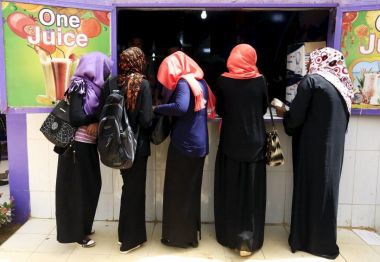Sudan: Two Christian women found guilty of public indecency

Two of the 12 women arrested when leaving church in Sudan on suspicion of committing "public indecency" for violating the dress code have been found guilty and fined.
Ferdoos Eltoum and Rehab Omer Kakoum were found guilty of indecent or immoral dress under Article 152 of the Sudanese criminal code.
The women were part of a group of Christian women from the Nuba Mountains who were arrested on 25 June, after leaving a celebration service at the El Izba Baptist Church in Khartoum, Sudan. They were tried separately by the public order court.
Ms Eltoum's initial trial hearing was held on 6 July.
Christian Solidarity Worldwide (CSW), which has been monitoring the case, reported that her legal team presented two witnesses. A church minister testified that she had not violated Christian dress codes and a Sudanese woman testified that she had not violated Sudanese culture.
The judge made no ruling on the initial charge but laid another charge against her based on what she had worn to court and fined her 500 Sudanese Pounds, equivalent to £54. When Ms Eltoum appeared in court on 13 July for a ruling on her original charge, the judge refused to allow her lawyer, Mohaned Mustafa, to remain in court to defend her.
Ms Rahab Omer Kakoum's hearing was on 14 July and she was also found guilty under Article 152 and sentenced to a fine of 500 SDP or two months imprisonment if she does not pay the fine. The judge in this case allowed the prosecution to present its case and prevented the defence from presenting witnesses or any arguments.
In a separate development, three Christian minors were arrested on 7 July and charged with the theft of a ring and bracelet from a home where one of their mothers works as a housekeeper. Despite a lack of evidence, Monica Idress Kodey, 15, Samra Haroun Mustafa, 16, and Reem Abd Alla, 17, were charged and detained for three days in an adult prison before being released on bail. A bail bond of about £300 was levied.
CSW said the increase in criminal cases being brought against individual Christians appeared to be part of an ongoing campaign of repression against ethnic and religious minorities in the country and a longstanding official policy of Islamisation and Arabisation.
Mervyn Thomas, chief executive, said: "We are deeply concerned by the increased use of criminal procedures to target young Christian women in Sudan. These cases highlight wider concerns regarding the mistreatment of religious and ethnic minorities in Sudan, especially those from Nuba Mountains, in violation of Article 18 of the International Covenant on Civil and Political Rights, guaranteeing freedom of religion or belief, and Article 2 of the International Convention on the Elimination of All Forms of Racial Discrimination, which places a burden on the state not to discriminate against different races or ethnic groups.
"The detention of three minors in an adult facility and the lack of due process in Ms Eltoum's and Ms Kakoum's cases are breaches of Sudanese criminal procedures and international law.
"Even more concerning is the broad interpretation of Article 152, which is used to harass women in Sudan. We call upon the Sudanese government to repeal or amend Article 152 and to uphold its obligations under international law by acquitting Ferdoos Eltoum and Rehab Omer Kakoum and dropping the charges against the other young women in their group. We also call for the cancellation of charges against the three girls falsely accused of theft. The international community must hold Sudan to account for these flagrant violations of international and domestic law."
Of the twelve women originally arrested by police and forced to strip after leaving a Baptist church, ten were charged with wearing immoral or indecent clothing.
Islamic law is strictly imposed in Khartoum, the capital of Sudan, and allows only hands, feet and face to be uncovered.











